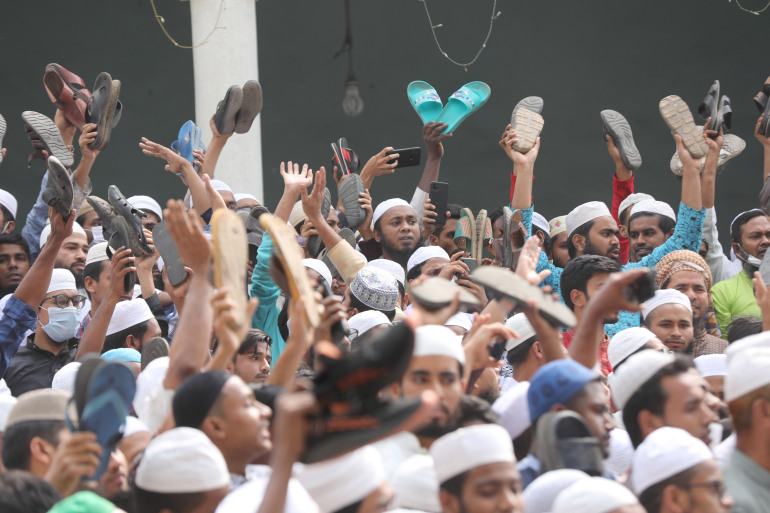Indian Prime Minister Narendra Modi is in Bangladesh to attend its Golden Jubilee celebrations of independence and the birth centenary of Sheikh Mujibur Rahman, the country’s founder and father of current Prime Minister Sheikh Hasina.
Modi’s two-day tour to the Muslim-majority nation, starting on Friday, will cap Dhaka’s 10-day celebrations already attended by leaders from Sri Lanka, Nepal, Bhutan and the Maldives.
During his visit, Modi will tour two temples in southern rural districts, including the birthplace of a prominent Hindu reformer who has millions of followers in the Indian state of West Bengal and Bangladesh.
Prime Minister Narendra Modi visits National Martyrs’ Memorial, Savar in Dhaka. pic.twitter.com/MkbyJ58UmV
— ANI (@ANI) March 26, 2021
Meanwhile, several protests have been held since last week to oppose the visit by Modi, who many Bangladeshis accuse of stoking religious tensions and persecuting Muslims in India.
On Thursday, police in Dhaka fired rubber bullets and tear gas at hundreds of mainly student demonstrators protesting against the Hindu nationalist leader’s visit and criticising the government for inviting a leader who they say has blatantly persecuted Muslims in India.
The protesters said more than 1,000 people, most of them Muslims, were killed in the Indian state of Gujarat in 2002, when Modi was the chief minister.
“His government has passed several laws which make Muslims a second-class citizen in India. We don’t want him here in Bangladesh,” said Maulana Mamunul Haque, secretary-general of Hefazat-e-Islam, an Islamist group that protested against Modi’s visit outside the capital’s Baitul Mukarram mosque last Friday.
“A leader like him should not be allowed to attend the 50th Independence Day event,” Haque told Al Jazeera.
Even though Hefazat-e-Islam calls itself “non-political”, the Islamist group has gained eminence after the fall of Jamaat-e-Islami, Bangladesh’s largest Islamist political party.
At the protest outside Baitul Mukarram mosque, Hefazat supporters slammed Modi for “killing Muslims in Gujarat, Kashmir, Delhi and other parts of India”. They took their shoes in their hands to show disrespect to the Indian leader.
 Demonstrators raised their shoes in their hands to register their anger [Mahmud Hossain Opu/Al Jazeera]
Demonstrators raised their shoes in their hands to register their anger [Mahmud Hossain Opu/Al Jazeera]
Foez Ullah, president of the Bangladesh Students’ Union, said Modi’s policies go against the basic tenets of Bangladesh’s founding principles.
“Inviting India’s riotous, communal prime minister Narendra Modi to the golden jubilee of independence is against the spirit of the liberation war,” the group said in a statement.
India helped Bangladesh gain independence from Pakistan through a nine-month bloody war in 1971. India and Bangladesh have since shared close ties.
Earlier this week, Bangladesh’s Foreign Affairs Minister AK Abdul Momen told Al Jazeera that since India helped Bangladesh achieve its independence, “so it is very natural that the Indian prime minister will be asked to become Bangladesh’s Golden Jubilee celebration’s main guest”.
“We are not concerned what the fundamentalists are saying about Modi’s visit. They do not represent the voice of the country’s people,” he said, adding that “only a small fraction of people” were protesting.
“They are making an issue out of it without any valid reason,” he told Al Jazeera.
But Imtiaz Ahmed, professor of international relations at Dhaka University, feels inviting Modi for the celebrations was “not a good choice”.
“Along with the Golden Jubilee, we are also celebrating the birth centenary of father of the nation. Sheikh Mujib fought for a secular nation whereas Modi is inherently communal. He [Modi] is criticised in his own country for his hardliner Hindu nationalist stance,” Ahmed told Al Jazeera.
Ali Riaz, distinguished professor of politics and government at the Illinois State University in the United States, told Al Jazeera there was widespread discontent among a large number of Bangladeshis about the unequal relationship between India and Bangladesh.
“It is generally understood that India has enormous influence on the domestic politics of Bangladesh. BJP leaders’ derogatory statements about Bangladeshis and discriminatory policies of the Modi government have also compounded the situation,” he said.
Faisal Mahmud contributed to this report from Dhaka, Bangladesh






